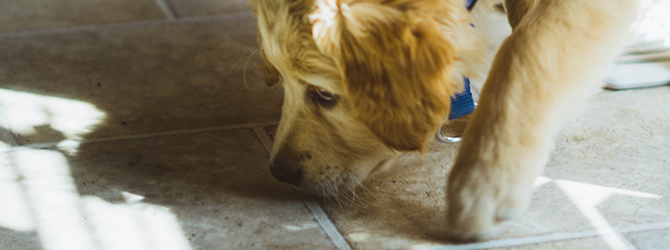Dog eats rat poison? What to do and how to avoid it
First Published: 28/02/2019
Last Updated: 08/01/2024
Rat poison is highly dangerous to dogs and can often be fatal to them if they ingest it. Rat poison and dogs shouldn’t really live in the same house, and if you do have a rat problem, we advise using other methods of getting rid of them. Let’s take a look at the nasty effects of rat poisoning, prevention tips and what to do if your dog eats rat poison.
Why is it so bad if a dog eats rat poison?
Rat poison and similar rodenticides are designed to kill rats, mice and other common household pests. In order to be fit for purpose, they’re full to the brim of highly toxic chemicals, chemicals that waste no time killing pests.
Because the pests must be drawn to the poison in the first place, they also contain ingredients that make them tasty and appealing, which is why dogs will eat the poison if they come across it.
Their appealing taste is what makes them so dangerous to our pets, and why we strongly advise against using them, even pet-friendly ‘bait-boxes’, if you have pets.
Read more: Tips for keeping your pet safe
The damage of rat poisoning
Internal bleeding – This is one of the most common (and dangerous) effects and can be fatal if your dog eats rat poison and it’s not treated quickly. You might see your dog vomiting blood, coughing blood, bleeding abnormally, bruising on their skin or blood appearing when they go to the toilet.
Kidney failure and damage to other internal organs – This may not appear straight away, so if you’re aware that your dog ate rat poison, take them to the vets immediately.
Symptoms
There isn’t really such thing as a pet-friendly rat poison. Contact your vet as soon as possible if you have used rat poison and your dog exhibits any of these signs:
- Their breath smells strongly of garlic or fish (and they haven’t eaten it)
- Their breathing is heavy or they seem to be struggling
- You find blood in their stool, urine or vomit
- Seizures
- General discoordination, depression or lethargy
- Nose bleeds
- Pale gums
My dog ate rat poison. What do I do?
Rat poison and dogs really don’t mix, so if this happens, treat it as an emergency. Get to the vets as soon as you can – contact your out-of-hours care provider if it happens at night, do not wait until morning!
If your dog ate rat poisoning recently, the vet will likely induce vomiting to remove the toxins from their system. Don’t try to do this yourself because there’s always the chance you can make things worse. Even if your pet vomits all of the poison up quickly, they are still likely to need further treatment.
It’s also a good idea to bring as much information as you can: the poison, the packaging and any other details you may have. This will help the vet because the faster they know what they’re dealing with, the faster they can take action.
Are you a cat owner? Are you concerned about toxic substances for cats? Click here to read more.
Read more: Search for more advice from our vets
So there are no pet-friendly rat poisons?
Just as you wouldn’t leave other toxic substances like chocolate lying around where your dog could access it easily, we recommend that you avoid using rat poison if you have pets in the house. Other methods of getting rid of pests include:
- Traps
- Natural repellents such as peppermint or other scents
- Seek the help of a pest control company
Have a chat with your vet about the best pet-friendly methods of getting rid of rats or other pests.
More info?
If you have further questions about rat poison and pets, have a chat with your local vet.
Find your nearest vet using our Find a Vet page, or speak to a vet online using Online Vets.


